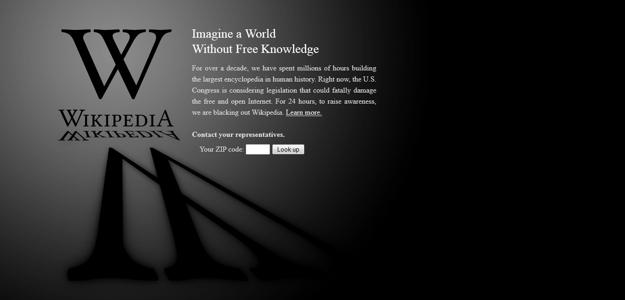 For the second time this year, online fount of all human knowledge Wikipedia went dark this morning, as access to the online encyclopedia was unavailable for a two hour period between roughly 6am and 8am Pacific. Was it another protest against potential government legislation that could impact the future evolution of the Internet, as per its January blackout? No; this time around, the entire site was brought down by someone accidentally severing the cables that connected the site’s servers to each other and the rest of the world.
For the second time this year, online fount of all human knowledge Wikipedia went dark this morning, as access to the online encyclopedia was unavailable for a two hour period between roughly 6am and 8am Pacific. Was it another protest against potential government legislation that could impact the future evolution of the Internet, as per its January blackout? No; this time around, the entire site was brought down by someone accidentally severing the cables that connected the site’s servers to each other and the rest of the world.
According to the Wikimedia foundation, the disruption in service was noticed somewhere around 6:15 am PDT, and the result of “severed network connectivity” between Wikipedia’s two data centers, headquartered in Tampa, Florida, and Ashburn, Virginia. “Upon checking with our network provider, they informed us that the outage was caused by a fiber cut between the two data centers,” the foundation reported, adding that service was restored to all but the mobile site by 7:18 am PDT, with full service back by 8:35 am.
The latest blackout was immediately noticed by those who regularly use the online encyclopedia for everything from term papers to trying to find out just what the real title of that “Let The Sun Shine In” song from Hair is really called (It’s “The Flesh Failures,” if you’re thinking of this version; you’re welcome). Wikimedia Foundation spokesman Jay Walsh was quoted in the Washington Post as saying that there was “no reason to believe that [the outage] was intentional,” going on to say that there was no suggestion of foul play behind what had happened. Instead, the culprit for what happened was believed to be simply the accidental severing of two overland cables were cut between the two data centers, although the Wikimedia statement said that the foundation was “now working with our network provider to determine how and why we were impacted by that fiber cut when we are supposed to have redundancy in our network,” and that it was “still waiting for their full report.”
This marks the second outage for Wikipedia since the start of the year; on January 18, the site voluntarily went dark for 24 hours in protest against the Stop Online Piracy Act and Protect Intellectual Property Act that were both under discussion by lawmakers at the time. Wikipedia founder Jimmy Wales, a vocal critic of both acts and the negative effect he believed both would have on the Internet should they become law, proposed the temporary closedown which was then voted upon by Wiki users and editors. The resultant publicity – and minor panic over what a world without Wikipedia would be like – resulted in a far greater awareness about both acts, and resulted in a vocal swell of outcry against the two.


